Stories about...Undergraduate STEM Outreach
 BIOE435 Capstone Projects—BIOE Seniors Use Knowledge/Skills to Problem Solve
BIOE435 Capstone Projects—BIOE Seniors Use Knowledge/Skills to Problem Solve
May 12, 2021
There comes a point in a Bioengineering (BIOE) student’s career at Illinois when they get to demonstrate all the knowledge and skills they’ve acquired, in combination with their creativity and acuity in problem-solving, to come up with a viable solution to a real-world problem. Assistant Professor Holly Golecki’s BIOE 435 Senior Capstone Projects course is one such pivotal point for BIOE seniors—it’s a final chance to prove themselves prior to entering the real world as engineers. Thus, for the students, as well as their professor, the most exciting event of the Spring 21 semester was finally getting to present their completed projects at the May 4th BIOE Senior Design Virtual Symposium—something they’d worked toward for not just a semester—but their entire four years at Illinois, actually.
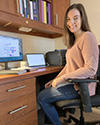 DaRin Butz Scholars Program Uses Research to Direct Engineering Undergraduate Women onto a STEM Career Trajectory
DaRin Butz Scholars Program Uses Research to Direct Engineering Undergraduate Women onto a STEM Career Trajectory
September 22, 2020
The goal of the Grainger College of Engineering’s DaRin Butz Foundation Research Scholars program is to encourage Illinois undergraduate women in engineering to pursue careers in science and engineering by immersing them in authentic research opportunities under some of Illinois’ premier researchers. The program, funded by the DaRin Butz Foundation since 2018, is under the umbrella of Grainger’s Illinois Scholars Undergraduate Research (ISUR) Program. The seven summer 2020 DaRin Butz scholars not only conducted research this past summer or during the 2020–21 academic year, but received professional development on how to present their research, then had opportunities to do so, such as in ISUR’s Fall 2020 Engineering Research Fair. Plus, the women had/are having a chance to network and through mentoring, discover what graduate school and/or careers in research might be like.
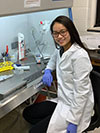 Undergraduate Women Conduct STEM Research Courtesy of Engineering’s Clare Boothe Luce Scholars Program
Undergraduate Women Conduct STEM Research Courtesy of Engineering’s Clare Boothe Luce Scholars Program
September 15, 2020
Eight undergraduate women who are committed to research and who dream of attending graduate school and possibly even pursuing careers in STEM (science, technology, engineering, and mathematics) research are discovering what it might be like courtesy of the Clare Boothe Luce (CBL) Research Scholars Program. Housed in Grainger Engineering’s Illinois Scholars Undergraduate Research (ISUR) Program, CBL provides scholarships that allow these women to experience cutting-edge research in chemistry, physics, mathematics, or engineering while being mentored by some of Illinois’ premier researchers.
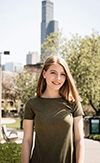 NCSA Summer Research Exposes Undergrads to Open Source Software, Possible Future Careers
NCSA Summer Research Exposes Undergrads to Open Source Software, Possible Future Careers
August 4, 2020
Exactly what is open source software? During the summer of 2020, thanks to the National Center for Supercomputing Applications (NCSA), four undergraduate students who participated in the REU INCLUSION (Incubating a New Community of Leaders Using Software, Inclusion, Innovation, Interdisciplinary and OpeN-Science) discovered just what open source software is: mostly free software whose source code is made publicly available so users can modify it to suit their needs. As part of this Research Experience for Undergraduates (REU), the students also helped to develop and contribute to some primarily open-source software projects. However, this software-in-research training experience was not just about exploring open source software and programming; students also received professional development, learned about how to present research then actually did so, plus made some relationships and networked with Computer Science researchers. In addition, a fifth student, a returnee from last year's REU INCLUSION, also conducted research as a part of NCSA’s International Research Internship.
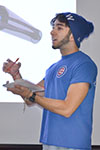 Bioengineering Design-a-thon Gives Students a Head Start in Designing Medical Products
Bioengineering Design-a-thon Gives Students a Head Start in Designing Medical Products
November 25, 2019
Bioengineering students who dream of designing medical products in the future got a taste of what it’s like during Bioengineering’s recent Design-a-thon on Friday–Saturday, November 8th–9th. Winners received prizes that anyone would love with the holidays looming: Amazon gift cards. However, while winning a prize was obviously an incentive, many students actually got involved for the design thinking training and to gain expertise in 3D CAD (computer-aided design), specifically Autodesk Fusion 360. Of course, for some, the main incentive was the thrill of competition.
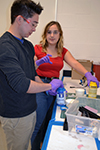 Bioengineering’s Golecki Uses Soft Robotics to Hook Students on Biomedical Engineering…STEM
Bioengineering’s Golecki Uses Soft Robotics to Hook Students on Biomedical Engineering…STEM
November 13, 2019
Working with students—opening their eyes to the possibilities—empowering students to believe that they deserve a seat at the table is really important to me.” – Holly Golecki
Holly Golecki, a new Bioengineering (BioE) Assistant Professor, is passionate about biomedical engineering, soft robotics, and using the two to pique young people’s interest in STEM. She’s particularly interested in steering girls onto the engineering pipeline.“I want to empower women and young girls to feel like they deserve a seat at the table in any engineering discipline,” she explains.
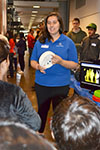 Fall 2019 Illinois Space Day Is Out of This World
Fall 2019 Illinois Space Day Is Out of This World
October 18, 2019
Would you like to blast off on a rocket ship some day to explore outer space? Doubless some of the around 200 people who showed up for Illinois Space Day (ISD) uon October 5th would. Among the 150+ visitors to the event at the Digital Computing Lab were some local teachers, parents, and lots of K–8th grade students—possibly with some future aerospace engineers or maybe even an astronaut or two among them. Also on hand were numerous Illinois Aerospace Engineering students, sporting t-shirts emblazoned with “The 50th anniversary of the Moon Landing!” to celebrate one of Man's most important forrays into space and the theme of the Day: the Apollo 11 mission. The Aerospace students’ goal in participating in the event was to not just share their passion for space with the young visitors, but also to possibly recruit some into aerospace engineering down the road, or to help pique the interest of a future astronaut.
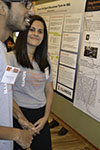 INCLUSION REU Exposes Undergrads to Computational Research Using Open Source Software
INCLUSION REU Exposes Undergrads to Computational Research Using Open Source Software
August 29, 2019
In the summer of 2019, eleven undergraduate students experienced a computationally-based summer research experience as a part of the National Center for Supercomputing Applications’ (NCSA) NSF-funded INCLUSION (Incubating a New Community of Leaders Using Software, Inclusion, Innovation, Interdisciplinary and OpeN-Science) Research Experience for Undergraduates (REU). In its third and final year, the REU allowed the students to acquire or improve their coding skills, possibly even learning a new programming language as they completed projects using Open Source Software. In addition to finding out what research is like, they also experienced another activity they will most likely use should they end up in grad school: they created posters then presented their research. Some of the students also figured out what their next step might be careerwise: matriculating to Illinois to further their education. Plus, the participants also made some relationships and did some networking.
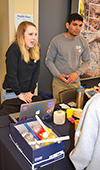 Design for America Espouses Human-Centered Design to Solve Unmet Needs
Design for America Espouses Human-Centered Design to Solve Unmet Needs
May 6, 2019
So you try something out and if it doesn’t work, stop doing it. If it is working, make it better and do it more. – Lucas O’Bryan on Design Thinking
The goal of the Illinois chapter of Design for America (DFA), according to its president, senior Lucas O'Bryan, is “to create local, social impact through projects that are focused on or partnered with community organizations.” So, through DFA, multidisciplinary teams of students seek to positively impact people’s lives by solving problems using the Human-Centered-Design Process
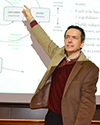 Via ENGINE, a Group of Illinois Educators Promote Using Playful Pedagogies to Engage Students
Via ENGINE, a Group of Illinois Educators Promote Using Playful Pedagogies to Engage Students
April 10, 2019
While Illinois students receive a good education and become highly sought after once they graduate, a group of Illinois faculty and educators believe faculty can do an even better job of engaging students. So a multidisciplinary team of educators with similar goals of improving education are collaborating in a new program called ENGINE: ENGagment In eNgineering Education, whose focus is for not just engineering faculty but all Illinois faculty to move beyond traditional teaching methods to explore a number of engaging new pedagogical strategies. A key objective, along with engaging students, is to share their passion for playful learning with other educators by developing resources then assessing the impact of these new teaching pedagogies to share with other faculty, both on campus and beyond.
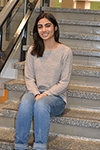 Bioengineering’s Saaniya Kapur Passionate About Biotech, STEM Outreach
Bioengineering’s Saaniya Kapur Passionate About Biotech, STEM Outreach
Feburary 8, 2019
Bioengineering freshman Saaniya Kapur’s parents never told her, “Oh, you're too young to do this!” Instead, Mom, who is preschool teacher, and Dad, who is a computer engineer, told her to go for it. So her early love of and exposure to science have shaped her dreams of a career in biotechnology. They have also fueled her passion for STEM outreach. Her goal? To give youngsters, as well as her peers, similar opportunities to fall in love with science the way she has.
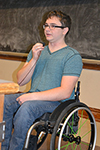 Liebenberg’s ME 270 End-of-Semester Main Project Presentations Showcase Students’ Manufacturability Redesigns
Liebenberg’s ME 270 End-of-Semester Main Project Presentations Showcase Students’ Manufacturability Redesigns
December 18, 2018
On Tuesday, December 11th, the top five teams in MechSE Professor Leon Liebenberg’s ME 270, Design for Manufacturability course presented their final projects before the entire class, as well as special guests, including some both current and emeritus professors and staff who contributed in some way to the students' projects. Attendees then voted on their favorite redesigned product.
The idea behind the course’s main project, Redesign for Manufacturability, was that teams of students were to purchase a product for less than $40 then redesign it so that it was simpler, used fewer parts, was easier to assemble or disassemble, could be made more inexpensively, and/or was easier to recycle. They were to test and evaluate their revised products and report their results in an e-portfolio. The top five teams were selected based on the following criteria: content and creativity, subject knowledge, composition, and contribution.
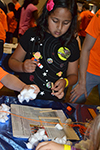 Illinois Space Society Provides Members Stellar Technical and Leadership Experiences to Prepare Them for Careers in Space Technology
Illinois Space Society Provides Members Stellar Technical and Leadership Experiences to Prepare Them for Careers in Space Technology
October 19, 2018
On October 6th, the Illinois Space Society (ISS) hosted the Illinois Space Day, a fun, event-filled day with all kinds of space-related activities. Previously this event has been intended for K-8 students, but this year the ISS expanded both their projects and activities to include high-school age students as well. Participants could view exhibits, marvel at demonstrations of various design projects, and participate in numerous hands-on activities.
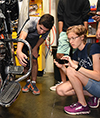 MechSE’s Leon Liebenberg, SIIP Team Use Play-in-Learning Elements to Engage Students, Foster Learning
MechSE’s Leon Liebenberg, SIIP Team Use Play-in-Learning Elements to Engage Students, Foster Learning
September 19, 2018
We’ve all seen toddlers learn about shapes by trying to place a round object into a toy’s square hole, and vice versa. We’ve also seen children learn basic structural engineering principles by building a tall tower of blocks or Legos with insufficient structural support, only to have it crash to the floor. If small children can learn through play, couldn’t much older students, such as undergraduates in Illinois Engineering courses? Leon Liebenberg, a MechSE Professor, and a team of colleagues who are part of his “Play-in-Learning: Cognition, Emotion, and Playful Pedagogy” SIIP proposal all seem to think so. However, Liebenberg reports, “Not everyone is convinced that play belongs in engineering…Some people are cynical or suspicious about the prospective benefits of play in engineering.”
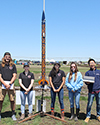 Illinois Space Society Provides Members Stellar Technical and Leadership Experiences to Prepare Them for Careers in Space Technology
Illinois Space Society Provides Members Stellar Technical and Leadership Experiences to Prepare Them for Careers in Space Technology
September 11, 2018
For the 150 or so members of the Illinois Space Society (ISS), the organization forms a community on campus where, according to ISS Director Sarah Legg, the “rocket nerds” from Aerospace Engineering (Aero) and beyond can get to know each other: “I've made my best friends here,” she acknowledges. “They're all rocket nerds.” In order to prepare members for careers in the field of space exploration, ISS also offers professional activities, including the opportunity to attend national conferences. To give its members hands-on, technical experience in rockets and space technology, ISS sponsors several different projects, many related to national competitions. Finally, to ensure that the next generation gets as excited about space as the ISS members are, its educational outreach experiences allow members to share their passion for space and rockets with interested youngsters of all ages. One of their biggies is coming up on October 6—Illinois Space Day.
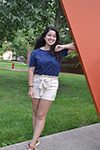 NRES Junior Alondra Estrada Passionate About Environmental Science, Research, and…Turtles!
NRES Junior Alondra Estrada Passionate About Environmental Science, Research, and…Turtles!
September 11, 2018
Growing up in Adison Illinois, Alondra Estrada, a first-generation Hispanic college student, wasn’t even sure she’d be going to college. Then she came to an Illinois summer camp and, as a result, she changed her mind about becoming a veterinarian and decided to study environmental science in Then, for the last two summers, she participated in the WE CAN which further muddied the waters regarding her next step career wise. Should she become an animal photographer, go to grad school and become an environmental scientist, or, go for her dream job, an environmental lawyer? While she isn’t sure what the future holds, she does know this: her many experiences have given her a lot of great career options.
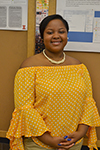 SPIN Introduces Shelana Martin to Cybersecurity and the Open Source Platform, Moodle
SPIN Introduces Shelana Martin to Cybersecurity and the Open Source Platform, Moodle
September 4, 2018
How did Shelana Martin, who’s not a computer science major, end up in an NCSA internship? The rising senior in education technology under the College of Education’s Learning and Education Studies program was part of NCSA’s SPIN (Students Pushing Innovation) internship program. SPIN fosters interdisciplinary collaboration, encouraging Illinois undergraduate students, and not just computer science students, to do challenging research related to cutting-edge new technology. The new technology Martin learned was Moodle, an open-source learning management system. Plus she also learned quite a bit about cybersecurity too.
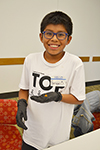 MechSE’s Joe Muskin Enlightens Local Youngsters About 3D Printing During Champaign Public Library Event
MechSE’s Joe Muskin Enlightens Local Youngsters About 3D Printing During Champaign Public Library Event
August 17, 2018
Does learning about STEM have to stop just because it’s summer vacation? A number of local youth (and their moms) say, “No!” So on July 25, 20 teens (and preteens) showed up at the Champaign Public Library (CPL) for 3D Pringing 101 to learn about, then experiment with, Stereolithographic 3D printing. Courtesy of Mechanical Science and Engineering’s Joe Muskin, the participants first learned a bit about the technology: they explored the equipment that's used, and learned how and why 3D printing works, including learning about the light spectrum. But even more fun was actually doing the printing itself; plus, they left the CPL armed with a couple of 3D printed objects they could whip out as proof when boasting about the activity to friends and family.
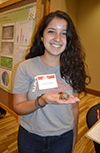 Illinois Summer Research Symposium Showcases Undergraduates’ REU Experiences
Illinois Summer Research Symposium Showcases Undergraduates’ REU Experiences
August 14, 2018
On July 19–20, 2018, over 150 undergraduate students and pre-doctoral students presented posters at the 2018 Illinois Summer Research Symposium (ISRS) as a culmination of their summer research experiences at Illinois. The students not only conducted studies in the labs of some of Illinois’ world-renowned researchers, but many of them were part of undergraduate programs that also partnered with SROP, the Graduate College’s Summer Research Opportunities Program. This allowed the undergrads to participate in professional development activities, many of them in preparation for possibly continuing their education and research in graduate school, and also provided the students networking opportunities.
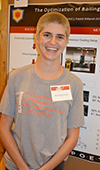 POETS REU Fosters Innovative Thinking to Change the Future of Power Dense Electronic Systems
POETS REU Fosters Innovative Thinking to Change the Future of Power Dense Electronic Systems
August 15, 2018
Ever wonder what the future of electronics could look like—say over the next decade? As part of the POETS (Power Optimization of Electro-Thermal Systems) ERC's 10-week, NSF-funded Research Experience for Undergraduates (REU), 15 students were able to explore the possibilities through authentic research experiences. Additionally, the students were exposed to a variety of educational programs that not only enhanced their knowledge base, and supplemented their research, but also exposed them to and prepared them for STEM careers.
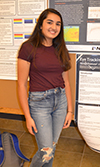 Undergrads Experience Open Source Software & Interdisciplinary Research Via INCLUSION REU
Undergrads Experience Open Source Software & Interdisciplinary Research Via INCLUSION REU
August 13, 2018
Twelve undergraduate students participated in the second summer of NCSA’s NSF-funded INCLUSION (Incubating a New Community of Leaders Using Software, Inclusion, Innovation, Interdisciplinary and OpeN-Science) REU (Research Experience for Undergraduates). Students gained skills they hope employ down the road, including coding in a new programming language and using Open Source Software. Plus, they got the chance to prepare a poster and present their research at the July 25th end-of-the-summer Poster Session at the NCSA (National Center for Supercomputing Applications). Participants also made some new relationships.
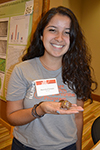 WE CAN REU Provides Minority Students an International Experience, Research at the Intersection of Engineering and Agriculture
WE CAN REU Provides Minority Students an International Experience, Research at the Intersection of Engineering and Agriculture
July 20, 2018
The six minority undergraduate students who participated in the USDA-funded WE CAN (Wildlife Engineers Co-managing Agriculture in Nature) REU (Research Experience for Undergraduates), spent the summer of 2018 learning what conducting research is like. However, because We CAN is a two-summer program, this summer’s research opportunity followed on the heels of last summer’s 4-week trip to South Africa where participants collaborated with South African students to do ag-related engineering projects. According to Agricultural and Biological Engineering Assistant Professor Paul Davidson, the focus of WE CAN was to recruit underrepresented minorities and train them for careers in agriculture. Of the six WE CAN fellows, three are African American, and three are Hispanic. And it just so happens that all six are female. “That wasn’t on purpose,” Co-PI Michelle Green, a Research Assistant Professor in Animal Sciences, qualifies, “but they were our best matches for the program.”
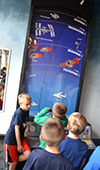 Orpheum Launches New Astronomy Kids' Corner With Help from Community Friends
Orpheum Launches New Astronomy Kids' Corner With Help from Community Friends
June 19, 2018
"My overall philosophy is that the museum is here really as an educational resource for the community. So that's what you elevate. That's what you focus on, and that's what we raise the bar on.” – Doug Brauer, Orpheum Children’s Science Museum Executive Director
Kids who dream of exploring "a galaxy far, far away," are intrigued with “launching” rockets, or who long to do astronaut stuff like mining asteroid rocks or climbing into a lunar lander, might want to visit the Orpheum Children’s Science Museum’s new Astronomy Kids' Corner. With some help from Busey Bank and a number of Mechanical Science and Engineering (MechSE) seniors who designed two space-related exhibits, the Orpheum in downtown Champaign launched the first stage of its new astronomy exhibit at a grand opening on Thursday, June 7th. The exhibit is part of Executive Director Doug Brauer’s efforts to expand the museum’s role as an educational resource for the community.
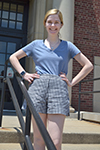 Aerospace Engineering Junior Suzanne Peterson Returns to G.A.M.E.S. Camp
Aerospace Engineering Junior Suzanne Peterson Returns to G.A.M.E.S. Camp
June 13, 2018
Most undergraduates rarely get an opportunity to participate in an immersive experience relating to their future career paths as early as high school. But rising senior Suzanne Peterson is a 5-time veteran of the University of Illinois G.A.M.E.S. camp, having first attended when it was still open to middle school students. Girls’ Adventures in Mathematics, Engineering, and Science (G.A.M.E.S.) is an annual, week-long event which allows high school girls to explore scientific ideas through demonstrations and activities. This year, Peterson will be on the other side of the event as a lab assistant who teaches several classes and sessions. Her own experiences at these camps as a young girl opened up the possibility of studying engineering, and she wants to pay it forward, saying, “I'm really passionate about outreach, and I would like to be [an inspiration] for somebody else.”
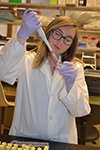 By Women, for Women: Kristina Allen Discusses Her Research in Women’s Health
By Women, for Women: Kristina Allen Discusses Her Research in Women’s Health
June 4, 2018
When most people think of anthropology majors, they may not picture them in a research lab. But rising senior Kristina Allen doesn’t let stereotypes cramp her style. She studies biological anthropology, which explores concepts ranging from human evolution to human biosocial variation from a scientific perspective. Her research focuses on reproductive ecology, and she jokes that she may be the first woman to ever say, “I love menstruation.” Allen held a love for science throughout her school years, and originally wanted to be a doctor, but switched out of premed after taking a few anthropology courses and realizing that her passion lay elsewhere. She seems to have found her niche, saying “I love what I do now.”
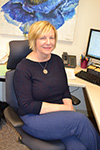 OUR Seeks to Change the Perception of What Undergraduate Research at Illinois Looks Like
OUR Seeks to Change the Perception of What Undergraduate Research at Illinois Looks Like
June 4, 2018
Exactly what is undergraduate research at Illinois? Is it one undergrad working in a lab? Is it a research-focused course with a capstone project? Is it not just a project, but a process? To all of the above, Karen Rodriguez’G, both the Interim and the Associate Director of the university’s Office of Undergraduate Research (OUR) says, “Yes!”
Rodriguez’G wears a couple of different hats at OUR. As Associate Director, she oversees the day-to-day function of the office. But as Interim Director, she describes her role as “forward facing for the campus—I am essentially the person in the office that faces everyone on campus.” For example, she works with higher ups, such as the heads of the university’s eleven research institutes, to discover what undergrad research looks like for them, what sort of partnerships can be put in place, and how her office can help to provide opportunities for students. Plus, she serves on several committees that address these issues as well.
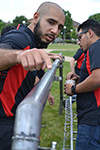 Building a Bridge to a Better Tomorrow: The 2018 National Student Steel Bridge Competition
Building a Bridge to a Better Tomorrow: The 2018 National Student Steel Bridge Competition
June 1, 2018
Would you participate in a national competition to build bridges simply for braggin’ rights? Barkin Kurumoglu, the National Co-director of the 2018 National Student Steel Bridge Competition (NSSBC) and a student here at the University of Illinois, certainly seems to think so. He claims “The unspoken goal is for schools to show who is better at civil engineering”. Lafayette College walked away with that honor, followed by California Polytechnic State University - San Luis Obispo in second place, and École de technologie supérieure in third place. The participants of the 42 teams in this year’s competition came from all over the nation, based on their scoring in the regionals. Some teams were even from other countries such as Canada, Puerto Rico and China.
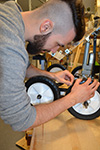 Illinois Robotics in Space Launches Conversation on NASA and Member Experience
Illinois Robotics in Space Launches Conversation on NASA and Member Experience
May 23, 2018
The word “lunatic” comes from madness caused by the moon, and the students here at Illinois are certainly crazy for the Illinois Robotics in Space (IRIS). A multidisciplinary RSO (registered student organization), IRIS recently participated in the NASA Robotic Mining Competition on May 14–18, 2018 at the NASA John F. Kennedy Space Center in Cape Canaveral where they were one of 56 teams this year. The goal of the competition was for the robots to autonomously mine gravel as if they were on Mars. In the future, these models could be used to mine icy regolith on the Red Planet, which could potentially help provide oxygen, fuel, and water for settlers.
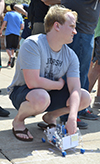 ME370’s Final Competition—March of the Automata—Fosters MechSE Students’ Creativity, Perseverance, and Teamwork
ME370’s Final Competition—March of the Automata—Fosters MechSE Students’ Creativity, Perseverance, and Teamwork
May 11, 2018
It was noon on Wednesday, May 2nd on Engineering Quad, and the hopes and dreams of a group of Mechanical Science and Engineering (MechSE) students were riding on the little robot they’d built for the ME370 projects course final competition: the March of the Automata. Their motivation? If their team’s automaton won the race, they’d not only have bragging rights, but they’d get a bye on the upcoming final exam.
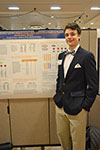 Undergraduate Research Week Showcases Illinois Undergraduate Students' Research
Undergraduate Research Week Showcases Illinois Undergraduate Students' Research
May 1, 2018
“The research process includes presentation; that’s something you need to learn how to do!” – Karen Rodriguez'G
As part of their research experience, around 1000 undergraduate students from across campus got a chance to hone their presentation skills during Illinois’ fourth annual Undergraduate Research Week on April 15th–21st. Students from a variety of disciplines across campus presented the research they’ve been conducting over this past semester or academic year. While the week featured a variety of events showcasing research or capstone projects in a number of units, its signature event was the Undergraduate Research Symposium, where the students who presented shared that along with learning a great deal about their topic and specific research methodology, their research experience also gave them insight into what they might want to do careerwise.
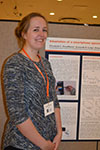 ISUR Poster Expo Showcases Engineering Scholars' Research
ISUR Poster Expo Showcases Engineering Scholars' Research
April 25, 2018
On Wednesday, April 18th, 26 engineering students who have been participating in the Illinois Scholars Undergraduate Research (ISUR) program had a chance to present about the research they’ve been conducting during the 2017–2018 academic year. For the scholars, the opportunity to do research in the lab of one of Illinois' world-class researchers not only exposed them to what research is like, but gave them a window into whether research itself, or the topic they'd been studying over the last year, might be a part of their career plans down the road.
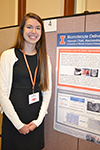 Engineering’s Undergraduate Research Office Encourages Undergrads to Experience Research
Engineering’s Undergraduate Research Office Encourages Undergrads to Experience Research
April 25, 2018
Tasha Mamaril has her finger on the pulse of research for Engineering undergrads. As the Coordinator of Engineering’s Undergraduate Research Office, she provides information to engineering students about what kinds of opportunities are available. Plus, she oversees two of Engineering’s specific research programs for undergrads: MUSE (Mentoring Undergraduates in Science and Engineering) and the Illinois Scholars Undergraduate Research (ISUR) program, which provides scholarships for students addressing research related to the interests of the corporations which fund the program.
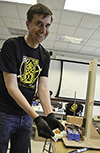 MechSE Outreach Guru Joe Muskin Exposes Teachers, Students of All Ages to STEM Education
MechSE Outreach Guru Joe Muskin Exposes Teachers, Students of All Ages to STEM Education
February 15, 2018
If you make the rounds of campus outreach very often, you will soon discover that one of the constants in the STEM-education-outreach universe is Joe Muskin. Education Coordinator for Mechanical Science and Engineering (MechSE), Muskin is an outstanding ambassador, both for his department and for the University. A tireless, creative teacher, he’s come up with innovative ways to communicate the material he’s teaching for the countless STEM education activities he’s been involved in. From teachers, to current Illinois students, to high school students, to elementary (and even pre-school) students, he’s broadened the knowledge of those he’s worked with about specific areas of engineering as well as STEM outreach. Regarding long-term impacts, he’s helped to pique participants’ interest in engineering and STEM education/outreach and has helped to recruit students into engineering, STEM, and to Illinois.
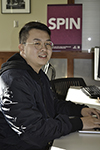 NCSA’s SPIN Program Exposes Illinois Students to Innovative, High-Tech Research
NCSA’s SPIN Program Exposes Illinois Students to Innovative, High-Tech Research
November 30, 2017
Illinois undergraduate students seeking to do challenging research on campus, especially related to cutting-edge new technology, need look no further than NCSA’s SPIN (Students Pushing Innovation) program. Begun in 2012, it was created to support undergraduate research on campus and also to provide access to new technology—high-performance computing, data analysis and visualization, or cybersecurity, to name several. The gist of the program? Students get to do cutting-edge research in new technologies mentored by world-class researchers— possibly using NCSA’s Blue Waters supercomputer.
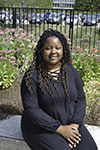 Sistas in STEM (SIS) Seeks to Provide Support for Minority Women in STEM
Sistas in STEM (SIS) Seeks to Provide Support for Minority Women in STEM
September 24, 2017
Back in August of 2015, there didn’t seem to be a specific organization tailored to meet the needs and interests of minority women in STEM fields. So five women on campus, including Shelana Martin, decided to start one: Sistas in STEM, a Registered Student Organization (RSO) that’s geared toward the cultural background of minority women. “We wanted to hone in on that cultural aspect and give them a safe space for coming with their problems,” Shelana acknowledges. But it was also important that the organization take into account the fact that they’re women.
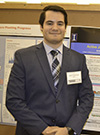 POETS’ REU Exposes Undergrad Students to Electro-Thermal Systems Research
POETS’ REU Exposes Undergrad Students to Electro-Thermal Systems Research
August 21, 2017
Ever notice how much heat your electronic devices give off? Four undergraduate students had an opportunity this summer to not only learn about this issue, but possibly help do something about it as part of the 10-week REU (Research Experience for Undergraduates) sponsored by the POETS (Power Optimization for Electro-Thermal Systems) Engineering Research Center.
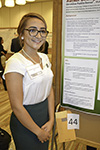 INCLUSION REU Seeks to Foster Diversity While Exposing Undergrads to Coding Via Open Source Software
INCLUSION REU Seeks to Foster Diversity While Exposing Undergrads to Coding Via Open Source Software
August 21, 2017
“We're doing this because we would like to get students that wouldn't have the opportunity otherwise to think about software, to learn about open source software, and then potentially be able to use that in either graduate school or in industry.” – Daniel S. Katz, PI
Ten undergraduate students were on campus this summer to participate in NCSA’s new 3-year REU, INCLUSION (Incubating a New Community of Leaders Using Software, Inclusion, Innovation, Interdisciplinary and OpeN-Science), funded through the NSF’s Office of Advanced Cyber Infrastructure. The goals of the REU are to enable ten undergraduate students each year to develop software and contribute to software projects, specifically Open Source Software projects; to make the population of software developers more diverse; and to foster cross-disciplinary collaboration across all fields with projects led by two mentors from different disciplines. Student participants gained skills they hope to use in the future: they learned about Open Source Software and programming; they learned how to present research; plus they made some relationships and networked.
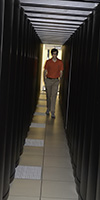 At Blue Waters Institute, Students Use Parallel Computing, Super Computers, to Speed Up Research
At Blue Waters Institute, Students Use Parallel Computing, Super Computers, to Speed Up Research
June 28, 2017
With the goal of learning High-Performance Computing (HPC), 26 students were on campus from May 29th through June 9th as part of the 2017 Blue Waters Institute. While some were graduate students from the XSEDE project, 18 were undergraduate Blue Waters Interns. Not only did these interns spend two weeks learning about parallel computing, but over the next year, they will continue to use their newly acquired HPC skills—and the Blue Waters Super Computer—to analyze data for their Blue Waters research projects back at their home institutions.
FULL STORY
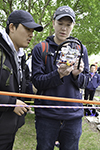 ME370 Students Find End-of-the-Semester Robot Races a Fun Learning Experience
ME370 Students Find End-of-the-Semester Robot Races a Fun Learning Experience
May 9, 2017
There was a lot riding on the 36 little robots navigating the ropes stretched across Boneyard Creek for ME 370's final competition. Held just north of the Engineering Building at noon on Wednesday, May 3rd, the contest drew a crowd of interested spectators who vicariously experienced the little robots' ups and downs, "oohing" and "ahing" during the spectacle. For the students, the contest not only motivated them to show off their engineering prowess; it got their competitive juices flowing as they sought to beat the socks off their opponents. And as an added incentive, teams whose robots beat the time set by Professor Socie's robot got to skip the upcoming final exam.
FULL STORY
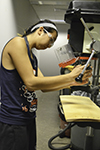 New ENG 198 Course Teaches Freshmen the Engineering Process, Teamwork, While Addressing Personal Mobility
New ENG 198 Course Teaches Freshmen the Engineering Process, Teamwork, While Addressing Personal Mobility
November 9, 2016
The idea behind ENG 198, the new Engineering course being piloted in fall 2016, is to give freshmen a chance to discover what it’s like to be an engineer early on…with a few caveats. Working as part of an interdisciplinary team, students are to come up with an innovation of benefit to society in the area of personal mobility. Plus, despite the students being freshmen, course planners don't intend to smooth out the path for the students; they want the students to navigate some bumps in the road—just like real engineers do. The goal? For students to learn the engineering process, experience teamwork, and come up with an end product that—while not necessarily 100% successful—lets them experience having contributed to society.
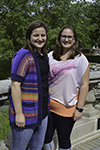 Pakeltis Sisters Hope to Increase the Number of Women—Change the World Through Engineering
Pakeltis Sisters Hope to Increase the Number of Women—Change the World Through Engineering
October 7, 2016
While the old Irving Berlin song, “Sisters, Sisters,” may not exactly be the theme song of the two Pakeltis sisters, a couple of lines fit Grace and Abby to a T. One is the last phrase of: "Two different faces, But in tight places, We think and we act as one." For instance, they’re both studying Engineering at Illinois. Grace, the oldest, is a senior in Materials Science Engineering (MatSE), while sophomore Abby is in Mechanical Science & Engineering (MechSE).
FULL STORY
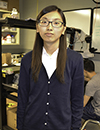 POETS REU Helps Illinois Undergrad Sabrina Yin Choose Her Career Path
POETS REU Helps Illinois Undergrad Sabrina Yin Choose Her Career Path
August 22, 2016
Most REU (Research Experience for Undergraduates) participants have an opportunity to conduct research for 8–10 weeks during the summer. Their experience then culminates in a poster session—the highlight of the summer—which gives the undergrad the chance to hone his or her skills while creating a research poster and reporting results. However, POETS REU participant Sabrina Yin, a rising junior majoring in Mechanical Engineering at Illinois, is doing more than just a couple of months worth of research in the summer. Yin began working in researcher Nenad Miljkovic’s Energy Transport Research Lab in March, participated in the REU this summer, and will continue her research in the lab this fall and beyond. “This research project that I’m working on will run for another two years approximately. So I’ll be staying in the lab to help out with the research,” she explains.
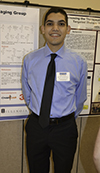 2016 Chemistry REU Offers Undergraduate Students a Glimpse of Grad Life
2016 Chemistry REU Offers Undergraduate Students a Glimpse of Grad Life
August 16, 2016
This summer at Illinois, five undergraduate students were chosen to be a part of the Chemistry REU (Research Experience for Undergraduates) program to get a glimpse of what research in graduate school looks like. Allison Fout, the PI for this REU, which currently is solely funded by 3M, said that out of 270 applicants, only five were chosen. According to Fout, applicants were selected based upon the following criteria: “Their grades, their letters of recommendation, their experience. (You could really gain experience by coming here)" she adds. Plus, she indicates that the final criteria was: "students that were interested in pursuing chemistry in the future. All of those things were part of what we were looking at.”
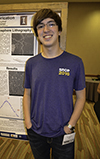 Undergrads Consider Nanotechnology Careers Thanks to nano@illinois REU
Undergrads Consider Nanotechnology Careers Thanks to nano@illinois REU
August 10, 2016
During the summer of 2016, ten undergraduate students learned about nanotechnology as part of the NSF-funded nano@illinois Research Experience for Undergraduates (REU). While spending the summer performing research in the labs of some of Illinois’ premier researchers, the students not only learned a lot about the area in nanotechnology that they were studying; they learned what grad school is like and got some pointers on how to apply. Finally, many of them discovered that they liked research…a lot. In fact, some even decided that the area they researched over the summer was the area they wanted to concentrate on in the future.
FULL STORY
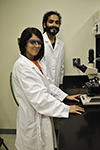 Undergrads in Bioimaging REU Experience What Research, Graduate School Is Like
Undergrads in Bioimaging REU Experience What Research, Graduate School Is Like
July 29, 2016
Ten undergraduate students from around the country participated in the NSF-funded Bioimaging Research Experience for Undergraduates (REU). Working alongside researchers in Illinois labs, they discovered the exciting world of bioimaging research, got a taste of what graduate school is like, and some might have discovered what they want to do for the rest of their lives.
 Wendy Reyes Learns Life Skills in Bioimaging REU
Wendy Reyes Learns Life Skills in Bioimaging REU
July 29, 2016
When rising junior Wendy Reyes spent the summer doing research in Professor Michael Insana’s Ultrasonic Imaging Lab as part of the 2016 Bioimaging REU, she learned a lot.She learned some research skills: how to train software to recognize cancer in the images of breast tissue.
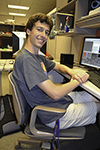 Bioimaging REU's Matt Kavanaugh Experiences Cancer Research at Illinois
Bioimaging REU's Matt Kavanaugh Experiences Cancer Research at Illinois
July 29, 2016
Matt Kavanaugh had originally applied to Illinois as an undergraduate, but finances prevented him from coming here. So he matriculated to the University of Kansas, where the rising junior is majoring in Chemical Engineering with a concentration in Biomedical. However, when searching for something productive to do over the summer, he came across the NSF-funded Bioimaging Research Experience for Undergraduates (REU) at Illinois.
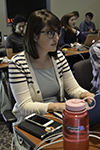 Students Acquire High-Performance Computing Skills During Blue Waters’ Petascale Institute
Students Acquire High-Performance Computing Skills During Blue Waters’ Petascale Institute
June 20, 2016
NCSA (the National Center for Supercomputing Applications) is changing the millennial generation and the future of big data with the Petascale Insititute. During the two-week institute, students go from knowing fairly nothing about HPC (High-Performance Computing) language to knowing enough to complete amazing research projects using the Blue Waters supercomputer. From May 22nd to June 3rd, 19 Blue Waters interns (undergraduate students), 10 XSEDE scholars (both undergraduate and graduate students), and four additional undergraduate and graduate students participated in the institute
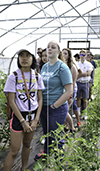 CGS's Summer Camps Teach STEM With a Global Flavor; Act as a Bridge to College
CGS's Summer Camps Teach STEM With a Global Flavor; Act as a Bridge to College
June 7, 2016
While one might not think of Illinois' Center for Global Studies (CGS) as a STEM unit, two of its three summer 2016 camps address STEM topics…from a global perspective. Sustainable Futures, from June 5–10, addressed a number of topics regarding sustainability. Global Health, in its first year, will address communicable diseases and epidemics. (The third, non-STEM camp is Intensive Arabic.) CGS Outreach Coordinator, Jeremie Smith, admits that while their camps are a lot of work, they’re valuable in a number of ways.
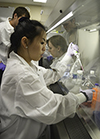 Bioengineering Undergrads Build Biobots in New BIOE 306 Course
Bioengineering Undergrads Build Biobots in New BIOE 306 Course
December 16, 2015
Biobots. The word smacks of scientific breakthroughs in the distant future, or the subject matter of some futuristic, sci-fi movie. But Illinois researchers are currently building and studying biobots as part of their research in this emerging field. However, they're not the only ones. This past semester, Illinois' Bioengineering department piloted a brand new course, BIOE 306, BioFabrication Lab, that teaches undergraduate students how to build them too. Developed as part of the NSF-funded EBICS (Emergent Behaviors of Integrated Cellular Systems) Science and Technology Center, the course distilled down cutting-edge EBICS research and initiated eight Bioengineering juniors and seniors into the mysteries of building with biology. In addition, the idea for this class was developed in part due to the Illinois Innovation Prize, which emphasized the need to teach the next generation of engineers and scientists how to "build with biology."
FULL STORY
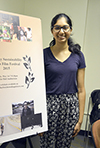 No Longer Just for Sleeping, Illinois Residence Halls Provide Learning Via LLCs
No Longer Just for Sleeping, Illinois Residence Halls Provide Learning Via LLCs
November 13, 2015
It’s not your mother’s dorm any more. In fact, according to Alma Sealine, Director of University Housing, and Nathan Sanden, Assistant Director of Residential Life, in the university housing world, dorm is a four-letter word—and not just because of the number of letters it has.
“The 4-letter word dorm means that you only eat and sleep in that location,” explains Sealine, “whereas we like the terminology residence hall because it accounts for the living and learning that occurs, in addition to just sleeping there.” Thus, the name Living-Learning Communities, or LLCs.
FULL STORY
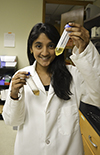 nano@illinois REU Undergrads Experience Growth Via Nanotechnology Research
nano@illinois REU Undergrads Experience Growth Via Nanotechnology Research
August 27, 2015
"I definitely think the best learning experiences are those that push you out of your comfort zone." – Rumya Raghavan
Eleven undergraduate students spent the summer working in the labs of some of Illinois' world-class researchers as part of the 10-week nano@illinois REU (Research Experience for Undergraduates). Not only did participants perform nanotechnology research, but they were challenged both professionally and personally as they learned new things about nanotechnology, about life in a research lab, and about themselves. As a result of their experience, some decided that graduate school might be in their future; some even considering careers in nanotechnology research.
FULL STORY
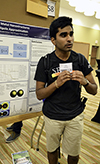 REU Undergrads Experience Research, What Graduate School Is Like
REU Undergrads Experience Research, What Graduate School Is Like
August 25, 2015
Twenty-six undergrads helped with cutting-edge research at Illinois this past summer as part of three NSF-funded Research Experience for Undergraduates (REU) programs: the nano@illinois, EBICS, and Bioimaging REUs. In addition to the research experience itself, as a side benefit, participants got to find out what being a graduate student is like and possibly decide if research—particularly the area they were studying this summer—might be the career for them.
FULL STORY
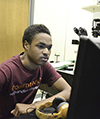 2015 EBICS REU Introduces Undergrads to the World of Research, Graduate School
2015 EBICS REU Introduces Undergrads to the World of Research, Graduate School
August 25, 2015
While performing cutting-edge research at Illinois this past summer as part of the NSF-funded EBICS (Emergent Behaviors of Integrated Celllular Systems) Research Experience for Undergraduates (REU), the five students gained more than a deeper understanding of the subject they were studying; they learned time management, networked with researchers, and experienced what it's like to be graduate students.
FULL STORY
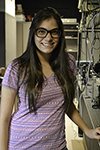 Summer Research Experience Exposes Undergrads to Bioimaging at Illinois
Summer Research Experience Exposes Undergrads to Bioimaging at Illinois
August 24, 2015
One goal of the NSF-funded Bioengineering REU (Research Experience for Undergraduates) was that students who participated this summer would consider going to graduate school, and hopefully in bioimaging—and it appears they might have achieved that goal. The ten undergrads who participated in the REU not only performed cutting-edge bioimaging research; they also found out what grad school is like, and some even decided that the area they researched this summer might be the career for them—and that Illinois is the place to prepare for it.
FULL STORY
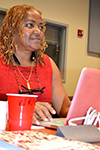 Petascale Institute Introduces Students to High-Performance Computing
Petascale Institute Introduces Students to High-Performance Computing
June 12, 2015
Most of the 34 students who attended the two-week Petascale Institute May 24th–June 5th are not in computer science; however, by the middle of the second week, they were glibly rattling off HPC (High Performance Computing) jargon, confidently referring to concepts most of us have either never heard of or have no idea what they actually are, like: OpenMP and MPI, vector accelerators, OpenACC, CUDA, debugging, optimization, and visualization. Their goal? To learn enough about parallel computing to be able to use Blue Waters or another supercomputer to analyze data for projects ranging from studying black holes, neutron stars, and galaxies, to natural language acquisition, visualization in cyber security, or protein folding using molecular dynamic simulations.
FULL STORY
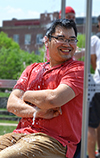 ME370's Drench-Your-Professor Competition Creates a Splash
ME370's Drench-Your-Professor Competition Creates a Splash
June 9, 2015
Mechanical Engineering students who took ME370 in Spring 2015 were tasked with designing a couple of mechanisms that would allow them to dunk their professor. Giving students hands-on, practical experience, the course taught them how to work as a team to design something on CAD, then build that mechanism. Part of the process involved overcoming obstacles—students would design, unsuccessfully test, then have to go back to the drawing board and improve their product. And, oh, yes, as added motivation, they got to vie for the chance to pay their professor back for all of those long hours of study by dunking him or her in the dunking booth set up on the Quad.
FULL STORY
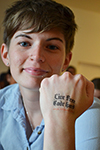 Interns Have an Up-Close-and-Personal Encounter With Blue Waters
Interns Have an Up-Close-and-Personal Encounter With Blue Waters
June 24, 2014
Ever want to take a super-computer for a spin? Students from around the country who participate in the Blue Waters Student Internship Program recently got to do just that. After learning about parallel programming—the language of supercomputers—the interns being exposed to HPC (High-Performance Computing) got to run their program on the University of Illinois' Blue Waters, one of the most powerful supercomputers in the world and the fastest on a university campus.
FULL STORY
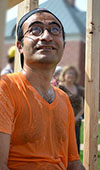 ME 370's Unique "Drench Your Professor" Competition Hones Students' Design Skills
ME 370's Unique "Drench Your Professor" Competition Hones Students' Design Skills
May 8, 2014
They came from far and wide that warm and sunny Wednesday afternoon in early May, until a crowd had assembled on Engineering Quad just outside the Mechanical Engineering Lab. They gathered there to experience the pageantry of the ME 370, Mechanical Design course's "Drench Your Professor" Competition, which pitted the course's Mechanical Engineering students and their machines against their professors.
FULL STORY
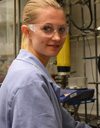 Chemistry REU Increases Likelihood That Students Choose STEM/Research Careers
Chemistry REU Increases Likelihood That Students Choose STEM/Research Careers
August 30, 2013
Fourteen young researchers from all over the U.S. were on campus this summer participating in a 10-week Chemistry REU program (Research Experience for Undergraduates) funded by the National Science Foundation. These undergrads experienced firsthand what research in chemistry is like at a world-class university— and what being a grad student might be like.
FULL STORY
 EBICS REU Students Experience Research on Biological Machines
EBICS REU Students Experience Research on Biological Machines
August 29, 2013
Not too long ago, the five undergrad students who spent the summer in Illinois labs could only have encountered biological machines in one place—straight out of Sci-Fi. But as part of EBICS' (Emergent Behavior of Integrated Cellular Systems) Research Experience for Undergraduates (REU) program, these students got to conduct research in ground-breaking new areas like biological machines and biomedical engineering.
FULL STORY
 Illinois To Participate in WitsOn—Online Class for Female STEM Undergrads
Illinois To Participate in WitsOn—Online Class for Female STEM Undergrads
September 4, 2012
To help promote retention of women in STEM (science, technology, engineering, and mathematics), Illinois will be participating in WitsOn (Women in Tech Share Online), an online class for female undergraduate STEM students. A joint project by Harvey Mudd College and Piazza, a course-management website...
FULL STORY
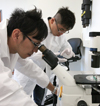 B3 Summer Institute Provides Interdisciplinary Training
B3 Summer Institute Provides Interdisciplinary Training
August 28, 2012
"So it's a good two-week, very intense, but very "get-your-feet-wet" sort of experience. The speaker list is phenomenal... You name the campus, and you've got all the big leagues from anywhere, from this campus and other campuses all over." Irfan Ahmad
Nicknamed B3SI by the planners, the two-week-long BioSensing BioActuation BioNanotechnology Summer Institute 2012, held at the Micro and Nanotechnology Laboratory (MNTL) from July 30–August 10, 2012, was intended to train participants at the intersection of biology and engineering and to foster networking with other researchers...
FULL STORY
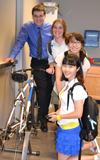 Engineering's Summer Scholars Creates Small-Campus Feel for Freshmen
Engineering's Summer Scholars Creates Small-Campus Feel for Freshmen
August 6, 2012
"Imagine coming to campus as a part of a group of twenty-two, and you have six RPAs and essentially have the resources of this university for 40,000 people, and you're here in the summer when it's nice and quiet and small." – Bruce Litchfield
Create a small-campus feel. This was the goal of Assistant Dean/Director Bruce Litchfield and IEFX Program Coordinator Michelle Adeoye...
FULL STORY
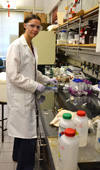 Summer Research Experiences Steer Undergrads Toward STEM Careers
Summer Research Experiences Steer Undergrads Toward STEM Careers
July 27, 2012
Instead of lounging by the pool this summer, a number of undergraduate students have been in Illinois labs—not only conducting research—but possibly figuring out what they want to do for the rest of their lives.
Participants in the National Science Foundation's Research Experience for Undergraduates (REU) program, these students are experiencing what real research is like. For many of them, this experience has also exposed them to what graduate school is like. For others...
FULL STORY
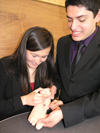 BioE Students Shine in Senior Design
BioE Students Shine in Senior Design
June 4, 2012
After several years of learning principles and how to apply what they had learned to come up with practical solutions for real-life problems, Bioengineering students were given the opportunity to do just that.
Sponsored by industry, university faculty, area medical clinics, and/or the community, Bioengineering seniors participating in this capstone design course over the past academic year completed projects that ranged from diagnosing cancer to designing a prothsesis that will enable below-elbow amputees to swim.
STORY
ITI in first year of NSF grant as "Research Experiences for Undergraduates" (REU) Site
October 15, 2009
The Information Trust Institute (ITI) at the University of Illinois at Urbana-Champaign has received a $357,000 award from the National Science Foundation (NSF) to create a “Research Experiences for Undergraduates” (REU) site.
STORY













.jpg)
















